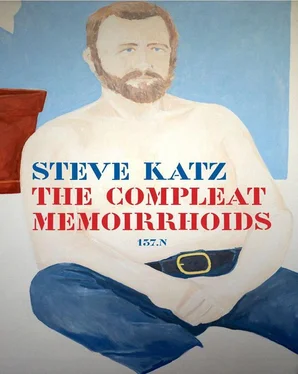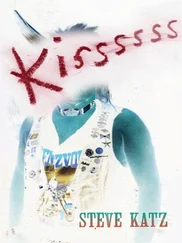Someone is tightening wing-nuts on the bolts that hold my head together. I am disappointing Connie. She doesn’t deserve it. I’m living with Jingle in a zone of betrayal, and she doesn’t deserve that. I stand Connie up, don’t even call her. I hide in my office and try not to think about the ecstatic moments I’m missing. I stay home with Jingle and the kids, and that feels comfortable, watching the rain, endless Oregon rain. Later that week I go to Connie’s apartment and walk in as usual. I don’t see her but I know she’s there. I try the bathroom door. It’s locked. She’s hiding in the bathroom. I knock on the door, pause, knock on it again and again. “Go away,” she finally says. “I just want to talk,” I say. “Apologize, I mean.” “Go away. I don’t care. Just go away.”
After what seems like hours she finally comes out of the bathroom. She looks totally unwelcoming and tired. I can’t think of anything to say. We have nothing to say to each other. I should leave, but I don’t. She fucks me in the kitchen, just to get rid me — on the stove, against the fridge, slipping across the table. We are finished, exhausted. We stand half undressed in the kitchen, looking at each other like strangers. We have nothing to say. An ambulance siren rips through the distance, probably headed for St. Mary’s hospital, where both my kids were born. I leave without a word. There are no more words. It’s over.
Trust never the three-year old. I was three once. That was when I held a chick in my hands. It was yellow and fluffy, and we both got very excited. This was at the Hardens in the Catskills. Hardens was a black farm family that in the summer rented room and board to some New Yorkers. I still have the buzz on the flypaper and the thick perfume of their dining room’s greasy air tucked into my memory. The memory would waft out whenever I ate at the Pink Teacup soul food café on Bleecker Street, or on my occasional trips to the South — whiffs of ham hocks and grits, greens in bacon grease, fatty ribs, chicken, black-eyed peas cooked endlessly on crusty griddles on old greasy gas stoves. And I can doze off to the leisurely death buzz of flies that stick to amber spirals of flypaper swaying everywhere as the ceiling fans stirred hot breezes in the dining room.
The chick was hot and throbbing in my hands, almost too warm, too pleasing to restrain. I knew what I was doing. I took this chick by its feet and stepped up onto a wooden crate next to the rain barrel under the eaves of the barn. I heard the chickens scratching and clucking as they ran loose around the yard. The mama hen, mother of this one, called her other chicks to peck where she scratched. Occasionally a rooster crowed. I had to find out what would happen. It was not without a small thrill of cruelty that I settled the chick into the water, and watched it struggle. The little critter quickly drowned. I was excited by this, confused, inebriated.
For my mom I invented a devious story, about how this little boy needed to find out if the chick could swim, or maybe it was a duck. Although I didn’t know the word, I represented it as an experiment. It was my first try at fiction, but it failed. My mother was totally embarrassed, had to apologize profusely to the Hardens, had to pay for a whole chicken. She never even scolded me, but I felt her displeasure, and suffered my first experience of guilt, that involuntary self-indulgence, repugnant and cloying as a tablespoon of blackstrap. I had to live with my shame for the rest of that vacation, which goes on forever. But there was also the thrill, the first taste of power for a small person, of having made a little death that caused a stir in commerce of the big people.
There should be some credibility given to the experiments of three-year-olds. I tried a chick in a rain-barrel and learned it couldn’t swim. It drowned instead. That gave me my first taste of megalomaniacal ecstasy, which was one of my first reasons for becoming a novelist. Literary characters resemble chickens; you can kill them for your sport. Fry them if they want to roost in the trees. They may have minds of their own, but you have all the weapons. It is a good thing there be this profession of novelist. It should be supported, for no other reason than it serves as a diversion for minor megalomaniacs. Keep them at their desks.
In contradiction to what I’ve said elsewhere in these Memoirrhoids , about the difficulty of writing from recent memory, because the stuff hasn’t had time to ripen and take on a shape, I offer the following that happened only a few weeks before this writing. Nikolai and Genevieve visited, with my three year old granddaughter. They came from New York to Cape Breton, where I owned some land, and had built a small cottage. I was in love with this Nova Scotia island, particularly with the western shore, where my place sat close to some cliffs above the beach. In 1971, when we visited Phil Glass and Rudy Wurlitzer, who had bought a large fishing camp here, a former tax write-off for some Rockefellers exploring for oil, I became obsessed with getting my own piece of land here. I had no money, but was determined to grab some acres somehow. Where else, I reasoned, could I get a piece of coast so gorgeous for less than the price of a used pick-up truck? We found ten acres by the shore, and in the next summer we cut a trail through the woods, cleared a space for a tent, and camped. We cut poles out of the woods, stripped them, and a couple of summers later packed in a large tipi. We spent many summers here living wild.
Guiding a small boat up and down the coast, we scavenged driftwood boards from the beaches and built a cookshack and a table. Each of my sons nailed together his own shelter — Nik a tower, Rafael an A-frame, and Avrum, later, a tent platform. It was the perfect place for me to get to get friendly with my kids in the summers after my wife and I separated. After a few years I put a road down, and with the help of John Ashby designed on napkins a small house over coffee at Albert’s on the corner. It got built over several years. I loved the people and the traditional music, the whales, and the easy-going Cape Breton ways. When summer came around I couldn’t go anywhere but Cape Breton. I did a lot of my writing there, producing my books from an old table by the window, looking at the ocean and at Margaree Island.
Selling the place for me was like selling a piece of my body. It was part of my identity for many years. My hope was to have great reunions there of family and friends, but my people’s lives took directions that kept them far away. It became too costly for my sons to pack their families to Cape Breton. They would show up only very occasionally. The precious solitude I always enjoyed slowly morphed into loneliness. Loneliness is to forsake, to forget yourself. Nikolai and his family showed up in my last year there for a four day visit. It was gratifying to see Genevieve, who cuts herself a taxing schedule of job, school, and child-rearing, melt into a more relaxed mode, and to see Nik get a bit of New York City grit out of his pores. Hannah, three years old, was quite a charming, if bossy little girl. It was great to watch her slowly become aware of where she was, and what pleasure wilderness and beach yielded. By the end of four days she was running around in an ecstasy of waves and wind and rocks and shells. She was already famous for a remark she had made getting out of a pool in Hampton Bays, where she was swimming with her father. She caught a glimpse of him naked, the first time she’d ever seen him uncovered. “Poppa,” she said. “You’d better cover that up before it gets worse.” On the day they were to leave she was relaxed and happy. She ran around the table after lunch and stopped by my chair. “Grandpa,” she said. “I know who you are.” She looked at me out of her three year old wisdom. “Who am I, Hannah?” I felt a thrill, talking directly and openly to this smart, self-assured child. “You’re Steve Katz,” she said, totally sure she was right. That was, to say the least, reassuring.
Читать дальше












